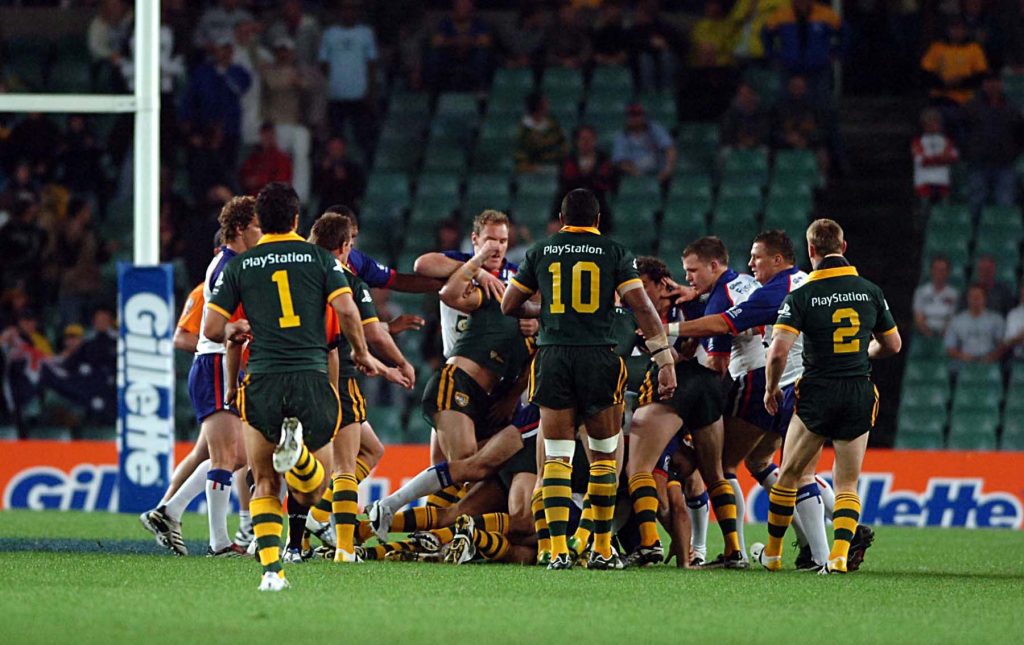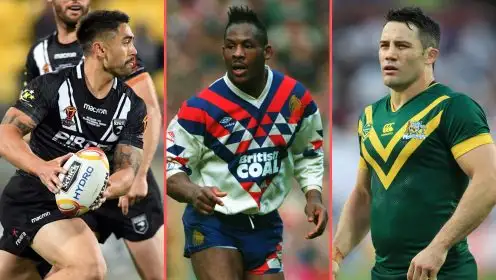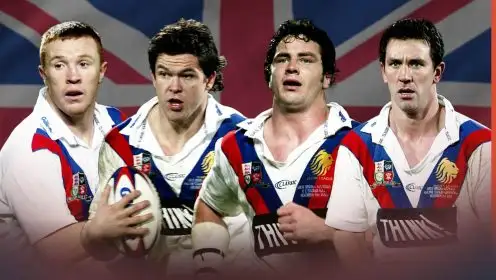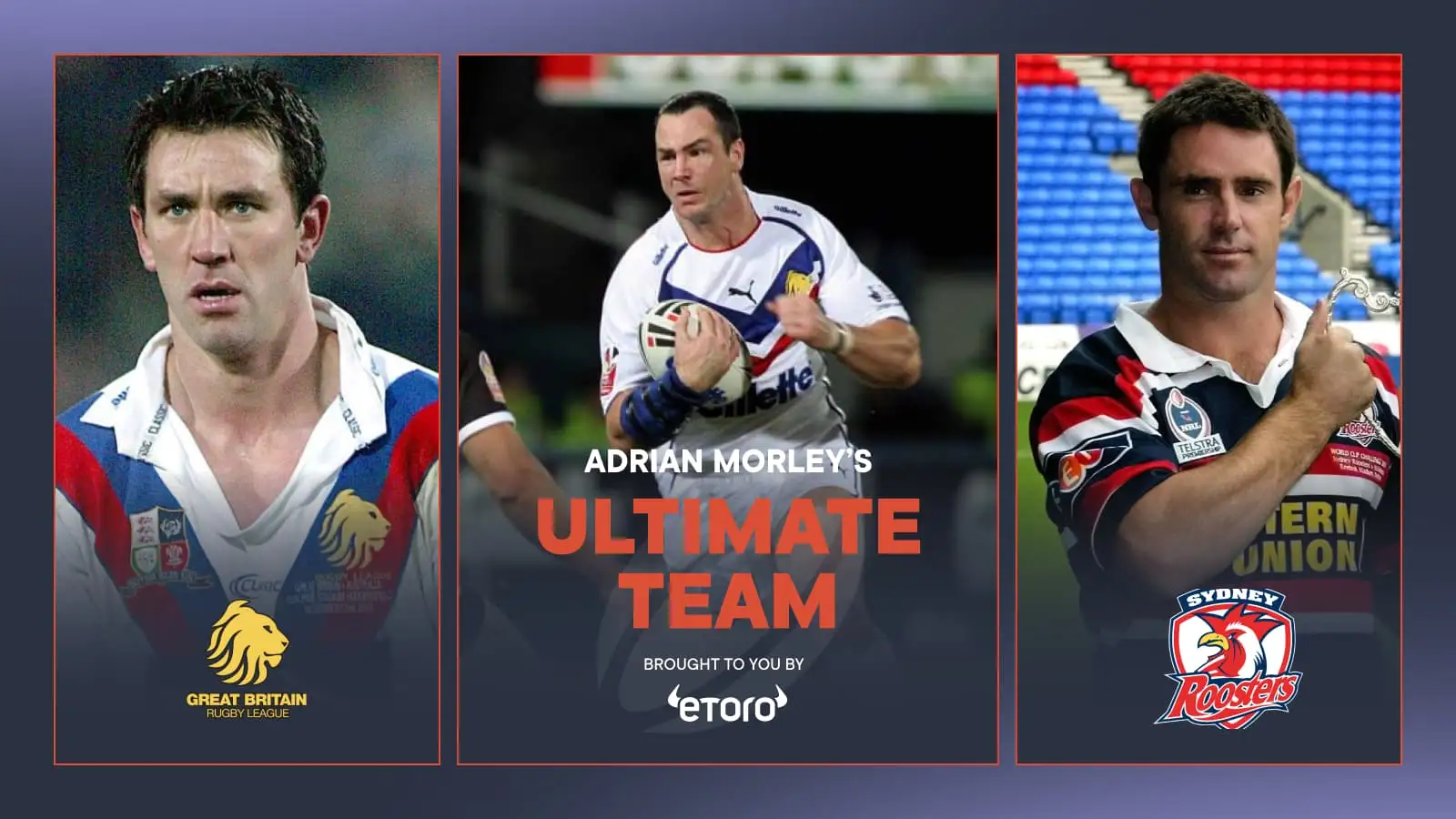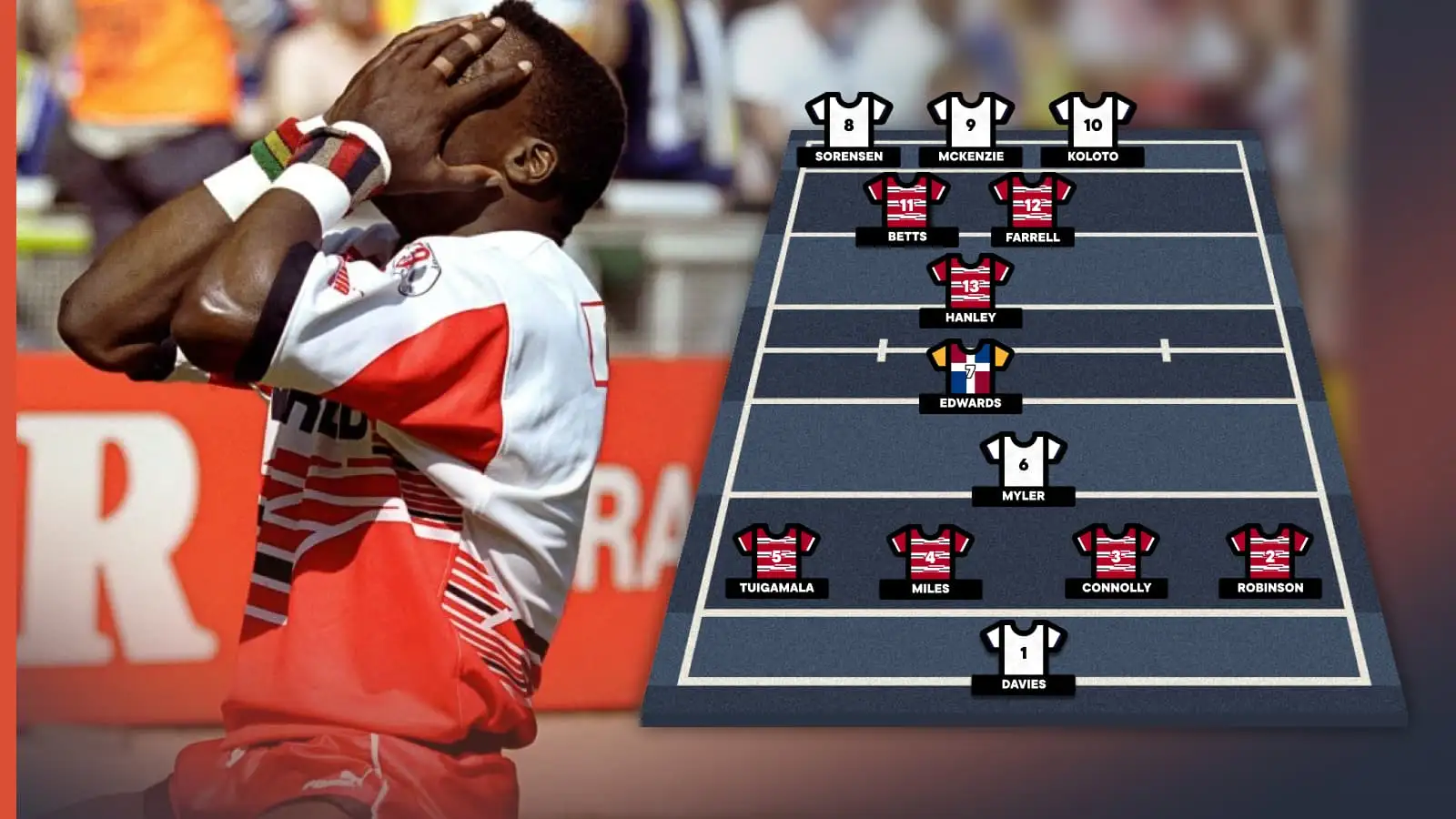Five overlooked storylines from Great Britain’s 2006 Tri-Nations tour
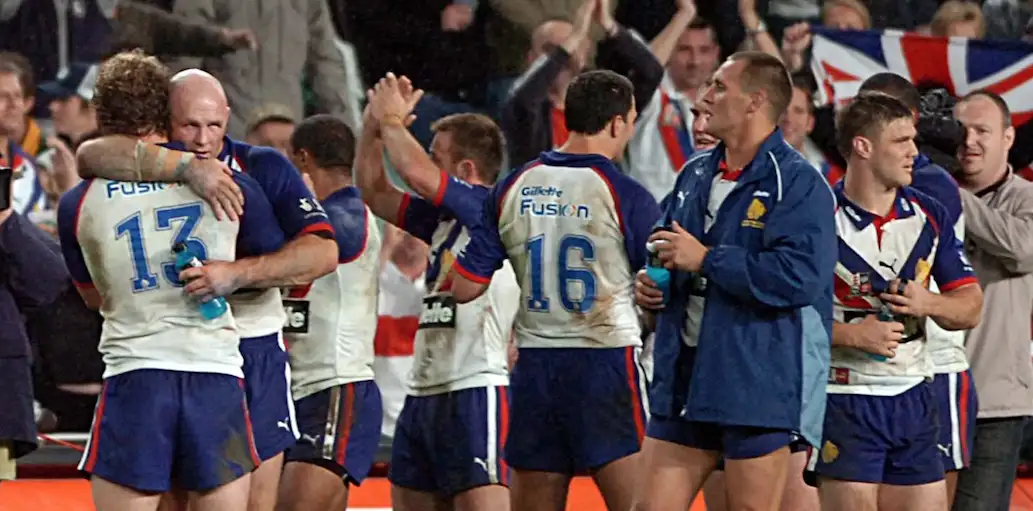
Rob Conlon has got a couple of funny but juicy tales for you about the 2006 Great Britain tour.
“It’s like a Tarantino movie,” Jamie Peacock says when we sit down to discuss Great Britain’s 2006 tour of Australia and New Zealand for the Tri-Nations. “There are a lot of things going on. It’s not just one main plot.”
Peacock, as ever, is right. So much so that after months of interviews and research into that tour, 3,500 words on BBC Sport still isn’t enough to cover everything that took place in one crazy month.
From petrol bombs to pub brawls, here are five overlooked storylines from the 2006 Tri Nations, although there remains countless untold stories yet to come to light.
Squad selection
In many ways, Brian Noble’s squad fell into place, with any contentious decisions taken out of his hands.
It’s strange to think that Jamie Peacock was not actually meant to captain the side, but rather Paul Sculthorpe, only for the St Helens skipper to be ruled out of a second-consecutive Tri-Nations through injury.
Noble’s selection was also made easier after Iestyn Harris and Keiron Cunningham stood down from Great Britain duty earlier in the year, although the coach did try to persuade the latter to reconsider his decision, but Cunningham stuck to his guns.
Bar far the most dramatic withdrawal came in the form of James Graham, Super League’s reigning Young Player of the Year at the time, who was ruled out after breaking his hand while celebrating St Helens’ Treble success.
A little worse for wear the morning after the Grand Final, Graham took a nap in Lee Gilmour’s hotel room, only to wake up and discover Gilmour and Leon Pryce had dyed his ginger hair black.
In a fit of rage, Graham tried to punch through a window, breaking his hand on the pane, and the incident came to a head when he tried to use a makeshift petrol bomb on his team-mates’ car before ramming his own vehicle into the back of Pryce’s.
It’s probably best we leave Gilmour to explain this one…
Joker in the pack
When speaking about the players that stood out most from his team, Brian Noble often returns to one of the debutants he selected for the tour.
Noble wasn’t completely decided on the make-up of his back-row until Gareth Hock shone in the warm-up victory over a Newcastle Select XI, with the Wigan man playing his way into the Test team.
Despite the successful outing, Hock had one major worry on his mind in the aftermath of the match. After being told by Terry Newton that Hock was disgruntled, Noble recalls their post-match conversation:
“Gaz, well done, you’ve had a cracking game. What’s up?”
“Well, I’m not right happy.”
“What are you not happy about?”
“Well, do we have to sing that song before the game?”
“What song?”
“That song they made us sing before the game.”
“Do you mean the national anthem?”
“Yeah, yeah, yeah – that one.”
“No, Gaz. If you don’t know the words you don’t have to sing that song, mate.”
Now, Noble laughs: “That was his only concern!”
Hock is often highlighted, by both Noble and other members of the squad, as a particular thorn in the Australian side that year, impressing with both his uncompromising physicality and slick skills on the ball.
Indeed, his performance in the win over Australia got him out of a spot of bother with Noble after missing the rehab deadline the following day as he was still in his hotel room ordering a bottle of champagne.
“I said to the senior management group – Peacock, Morley, Senior, Carney – that they can go out and I’ve only got one rule: they’ve all got to be in rehab by 8:30am the next morning,” Noble says.
“Some of them made the pool session at the Manly Pacific Hotel fully clothed and dove in. Some didn’t make it, like Gaz. We had to make special attempts to get Gaz down from his room with his bottle of champagne.
“Half-seriously I’d said those that don’t make the deadline aren’t going to New Zealand. I said to the boys, ‘He’s ordered a bottle of champagne. Fair play, let him off.’ I went to get him and brought him down. He’d had such a wow of a game.”
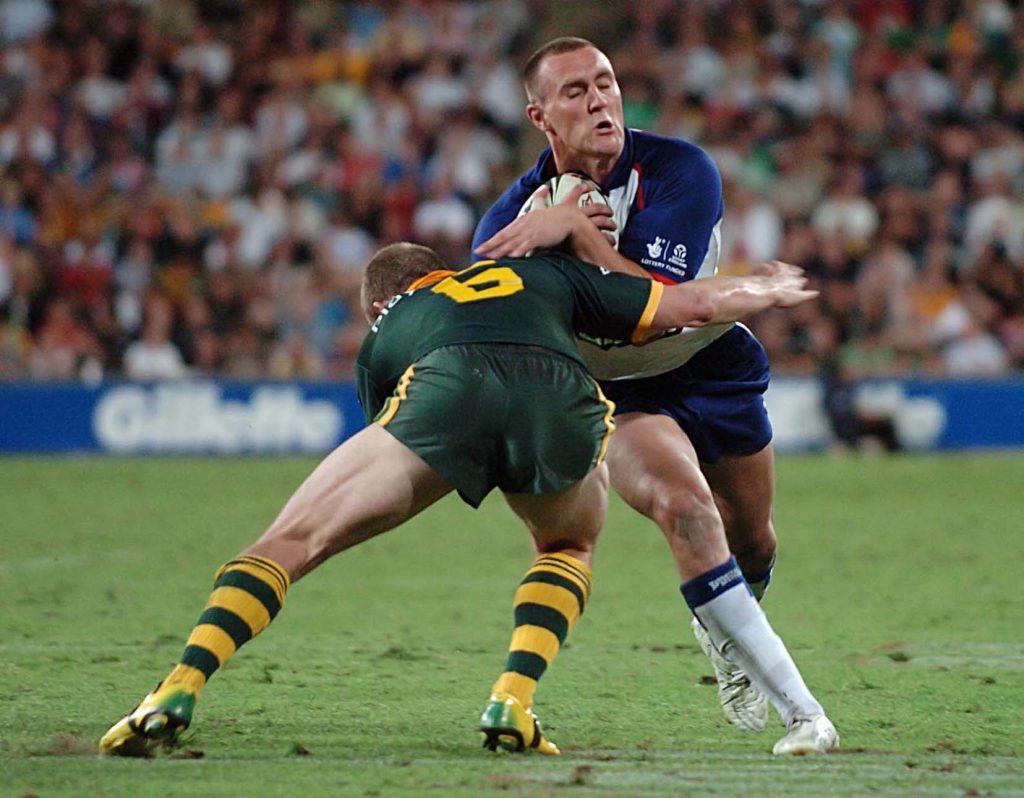
Pantomime villain
While he is best remembered for the incidents with Stuart Fielden and Sean Long in Great Britain’s win in Sydney, controversy followed Willie Mason wherever he went in the 2006 Tri Nations.
The tone was set for the rest of the tournament in the opening match between Australia and New Zealand, in which Mason was left in a heap on the floor following a massive shoulder charge from David Kidwell. The Kiwis went hunting for Mason after he was seen disrespecting the Haka, and it was later revealed he had taunted New Zealand full-back Brent Webb.
Webb was born in Australia, and Mason commented during the Haka: “He’s a f*cking Aboriginal. What’s he doing?”
Given Mason was born in New Zealand and has Tongan, Samoan and African-American heritage, it seemed a strange bone to pick with Webb – regardless of the fact Webb is not actually of Aborignal descent.
“The bloke’s got to have a good look at himself,” Kiwi coach Brian McClennan said at the time. “He said he [Webb] was Aboriginal. He got that one wrong as well. Really, the bottom line is that he keeps just mucking up all the time. He gets things wrong all the time, he’s becoming a joke.”
Reflecting on his own skirmish with Mason, Jamie Peacock says: “He’s a pantomime villain but back then, f*ck he was a good player as well. He’s a big bloke and he had some front about him. David Kidwell had damaged his pride and you could see he was seeking retribution.”
Even after the fiery clash with Great Britain, Mason still wasn’t finished. He returned from suspension in time to play in Australia’s golden point win over New Zealand in the final. Mason made his mark with one barnstorming run that left Motu Tony requiring a stretcher to leave the field, dazed and confused with blood pouring from a deep cut under his swollen eye.
But Mason was back in the newspapers after being thrown out of bar while celebrating his triumph. “He punched a wall, kicked over a bike and then ripped his shirt off and started challenging anyone to a fight,” one witness told Australia’s Daily Telegraph.
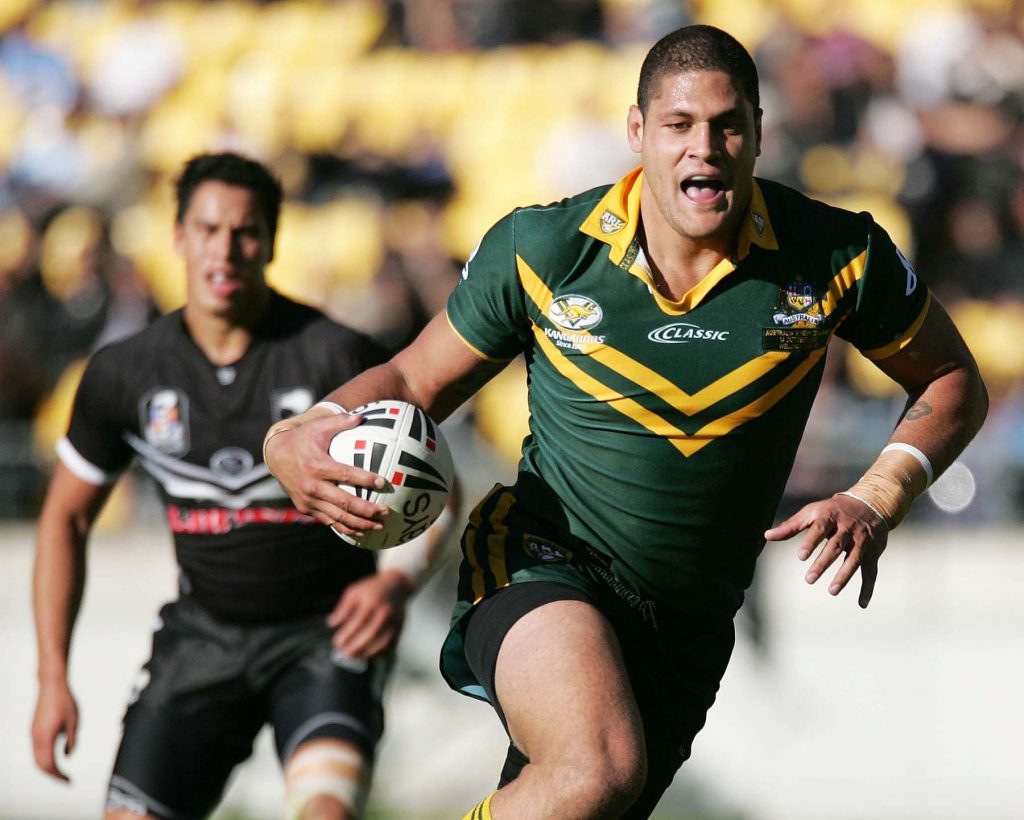
The real enforcer
The respective narratives around Jamie Peacock and Stuart Fielden are two of the most famous stories to be produced by that tour, yet all eyes in Australia were on Adrian Morley before the competition started.
Morley was essentially bidding farewell to Australia, having agreed to return to Super League with Warrington Wolves in 2007 following five successful years at Sydney Roosters.
His NRL career ended on our sour note, missing the final seven matches of the season after being suspended for a vicious knee to the face of Canterbury Bulldogs’ Corey Hughes.
Great Britain had a surprise source to thank for his suspension ending before the Tri-Nations, as none other than Willie Mason gave a character reference for Morley in his disciplinary hearing, noting: “I am writing in support of Adrian because I have a lot of respect for him as a person and as one of the toughest players in the toughest competition in the world.”
If Morley wanted to bow out in the southern hemisphere by proving he wasn’t a loose cannon, he went about it in a strange manner in Great Britain’s opening match against New Zealand.
In his first appearance for three months since being banned, it took just two minutes for Morley to fly out of the defensive line and poleaxe Kiwi captain Ruben Wiki with a ferocious high tackle. “Ohhh, not again,” Sky Sports’ Stevo groaned in commentary, referring to Morley’s infamous 12-second red card against Australia three years earlier.
Morley showed no signs of calming down in the second half, punching Brent Webb in the back of the head after the full-back caught him with an elbow. Webb joined Leeds Rhinos the following season to play alongside Jamie Peacock, but Peacock has little sympathy for his former team-mate, laughing: “He was just a gobsh*te to play against. He knows it, I know it, we all know it.”
Despite Morley’s indiscretions, he was cleared by a disciplinary panel – he described the punch as a “cat slap” – to play in Great Britain’s next fixture against Australia, albeit Brian Noble opted to use him as an impact substitute.
After three minutes, the cameras were focussed on Morley’s brooding face from the sideline after Mason knocked out Fielden and then fought with Peacock. But while all the attention post-match, and indeed post-tour, was on Peacock and co, Morley’s performance that night has perhaps never got the credit it deserves.
Replacing Fielden in the 14th minute, Morley played 66 minutes without a rest, relentlessly taking on Australia’s forward pack both in attack and defence without showing any of the recklessness of previous months.
If Morley was disappointed in the way things ended for him in the NRL, he made sure he put things right on that famous night in Sydney
View from the press box
BBC broadcaster Dave Woods has possibly a better perspective on that time than anyone else, having found himself at the centre of almost every major incident on the tour.
It was Woods to whom Leon Pryce muttered the immortal words “I’d rather be on Blackpool beach than Bondi beach”, although he actually tried to protect Pryce from getting into trouble
“As a journalist you’re quietly punching the air as he says that line,” Woods says. “He also said in that interview, and I decided to leave this out, ‘This is just a country full of flies.’ As we were sat there we were constantly swatting away flies. I thought, ‘If I put that in, he’s going to get absolutely crucified because that sounds very dismissive, it’s not very nice.’
“I wrote it up and it was absolutely astonishing the reaction it got. It was as if he’d criticised every Australian’s mother. There were headlines everywhere; even publications that weren’t covering the tour were suddenly wanting to speak to Leon about this ‘outrageous’ comment he’d made. Can you imagine if a Frenchman came over here and said, ‘I’d rather be in Toulouse than Tonypandy.’ People would just go, ‘Yeah, that’s fine. Whatever you think.’”
(Funnily enough, during the 2004 Tri-Nations, the Sydney Morning Herald published a story titled ‘Rather Penrith than Prague’ after a number of Australian players cut short a break in the Czech capital having decided it was “boring”.)
Woods was then given a 40th birthday to remember when he had the honour of commentating on Great Britain’s historic win at the Sydney Football Stadium.
“You can plan your 40th birthday to the nth degree but to be able to sit there and commentate on Great Britain beating Australia in Sydney is one of those just ‘wow’ moments. From a very self indulgent point of view it was just fantastic.
“You should always try and keep a level of neutrality. But when it comes to commentating on Great Britain rugby league, we’re all fans. You’re audience mainly wants Great Britain to win. I can’t remember what I said but I let myself go. It was probably some screeching nonsense.
“The only thing that spoiled it, and I’ve had this out with Nobby since, is that I had to go down and interview Brian for television straight away. It was as if he was coach of Bradford and they’d just beaten Wakefield. There was no emotion. I was expecting him to be doing cartwheels onto the pitch. He was really down and low.
“I’ve said to him since, ‘You spoiled that moment there. We should have been celebrating and you came out as if nothing special had happened.’ He said, ‘I did that on purpose because I wanted us to feel that beating Australia wasn’t a one-off. I wanted them to think that this is the norm.’
“Unfortunately it was a one-off.”
Following that match, Woods and the press pack were invited to Willie Mason’s remarkable disciplinary hearing, in which a lawyer representing Australia and Great Britain quoted verbatim what was supposedly said between Mason and Fielden in the build up to the knockout punch.
“You’ve got these two posh blokes with posh Australian accents, and one is saying, ‘Mr Mason said: ‘When I get up I’m going to f*cking hit you, you Pommy b*stard.’ And Mr Fielden then replied by saying: ‘Bring it on, you Aussie c*nt.’’”
Fielden retorted at the time: “It’s impossible to have a 10-minute conversation in five seconds. He makes it sound like we were pen pals, we were talking that much.”
Another illuminating experience came when boarding the fabled flight back from New Zealand to find a drunk Sean Long, Leon Pryce and Martin Gleeson sat in his and his colleagues’ seats.
“We weren’t going to ask them to move because they were in no fit state. We found three seats three or four rows back, so we had a bird’s eye view of everything going on. We were just thinking, ‘This is absolutely terrible from a public point of view.’
“After the plan set off Leon Pryce got up and moved to a row behind. It was almost like he realised this wasn’t good behaviour so he was almost extricating himself. Longy and Gleeson were singing and banging the seat in front of them.
“There was an English couple sat in front of them who I don’t think were anything to do with rugby league and they were clearly uncomfortable. It was loutish behaviour. It wasn’t outrageously bad, it was loutish and a bit loud.”
“I’ve seen a lot worse behaviour from people p*ssed on planes,” Jamie Peacock argues, but Pryce himself concedes: “I’ve seen a lot worse, but we’re representing Great Britain, aren’t we?”
After Long was subsequently sent home, Woods found himself in high demand and spent the rest of the day broadcasting from his hotel room. It was exciting work, but there was only one problem: they had tickets to see U2 in Sydney later that night.
“We managed to get this story done and dusted and then about eight of us jumped into two different taxis and hurtled off and raced into the stadium just as U2 started playing City Of Blinded Lights, so that became our anthem for that tour. It was almost as if they’d been waiting for us. What a day that was.”
Woods is covering the return of Great Britain and their tour of Tonga, New Zealand and Papua New Guinea this autumn, but it will be difficult to top 2006
“I remember being on a beach in the sunshine with my headphones on listening to U2 – City of Blinded Lights and just thinking, ‘This is the best time of my life. Nothing will ever beat this,’” he says.
“We had terrific camaraderie among the journalists. It was like 12 nights going on holiday, watching rugby league, reporting on rugby league, in the sunshine, in rugby league’s backyard. You’re travelling around having a fantastic time. You feel valued back home because people are interested in this tour. It was sensational. Absolutely sensational.”
